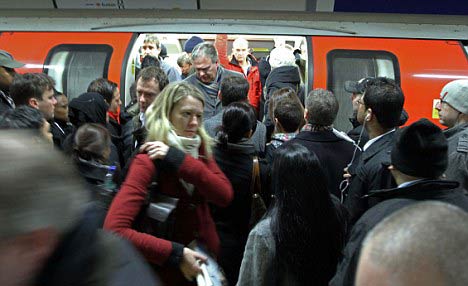|
 Get set: Next summer's Olympics are expected to cause chaotic overcrowding like that experienced during the tube strike earlier this year |
|
Transport bosses say a third of Londoners will have to work from home during next year's Olympic games to avoid chronic overcrowding on the capital's tubes and buses. Commuters have been told they can expect waits of over half an hour or more for tubes at some of the busiest stations on the Jubilee, Central and Northern lines during the games. And Transport for London(TfL) claims some of the busiest areas such as Canary Wharf will only be able to cope if 60 percent of workers change their travel plans. At a presentation last week, TfL urged small and medium-sized businesses to change their working hours or allow staff to work from home to help ease the pressure. TfL has published a list of the worst hotspots which include Stratford station, London Bridge, Canary Wharf, Canada Water and Bank. And the Olympics are set to cause chaos on the roads too with the creation of special 'games lanes' likely to bring many main routes to gridlock. The controversial lanes will be reserved purely for the use of competitors and VIPs. Even buses and taxis will be barred from using them. Around 5.3 million people are expected to turn up for the 16 days of the London Olympics. August 3 is expected to be the busiest day with around 800,000 people using public transport. Organisers fear a repetition of the 1996 Atlanta Olympics which became known as the 'Glitch Games' after transport chaos caused many competitors to miss their events. London transport commissioner Peter Hendy said he hopes London will copy the Sydney Olympics of 2000 when 27 percent of workers took leave from their jobs. He told the Observer: 'I am not going to be responsible for a transport mess like Atlanta.' Earlier this month the Mail reported how tube and train drivers will pocket up to £1,800 in return for promising not to go on strike during next summer's event. MPs condemned the payments as a ‘bribe’ and accused the unions of holding the public to ransom. (Read by Christine Mallari. Christine Mallari is a journalist at the China Daily Website.) (Agencies) |
英国交通部负责人称,为避免伦敦地铁和巴士长期拥堵的状况,明年奥运会期间三分之一的伦敦人将不得不在家上班。 乘车上下班的人被告知,奥运会期间,在银禧延长线、中线和北线最繁忙的一些车站,他们要做好半个多小时等一班地铁的准备。 伦敦交通部称,交通最繁忙的一些地区,如伦敦金融中心金丝雀码头,只有在60%的英国职员都改变出行计划的情况下才能应对奥运期间的人流。 在上周的一次演讲中,交通部敦促中小型企业改变它们的工作时间,或允许员工在家工作,以帮助减轻交通压力。 交通部还发布了一个最拥堵重点路段清单,包括斯特拉福德车站、伦敦桥、金丝雀码头、加拿大水和银行区。 随着奥运会的到来,英国将在路面上设置奥运特别车道,这也会造成交通混乱,让许多主干道陷入阻塞。 这些备受争议的特别车道将专门让竞赛者和重要人物使用,甚至连巴士和出租车也不准走这些车道。 在为期16天的伦敦奥运会期间,将有530万人涌入伦敦。 预计8月3日将是交通最繁忙的日子,那天将有约80万人使用公共交通工具。 组织者担心会重演1996年亚特兰大奥运会的失败历史,那届奥运会由于交通混乱导致许多竞赛者都错过了比赛,被称为“失误奥运会”。 伦敦交通委员会委员皮特•亨迪说,他希望伦敦能仿效2000年悉尼奥运会的做法,当时悉尼有27%的职员休假。 他告诉《观察者报》说:“我不想为像亚特兰大奥运会那样的交通混乱负责。” 据本月早些时候《每日邮报》报道,地铁和火车司机如果承诺在明年夏天奥运会期间不罢工,将获得1800英镑的回报。 国会议员谴责这一行为,称这种报偿是“贿赂”,并指责工会让公众买单。 相关阅读 (中国日报网英语点津 陈丹妮 编辑:冯明惠) |
|
Vocabulary: chaos: 混乱 turn up: 出现 glitch: 缺点;差错 |
